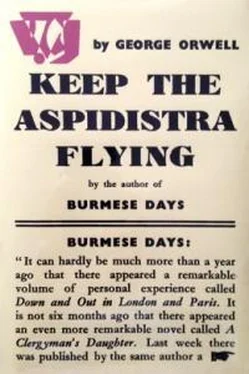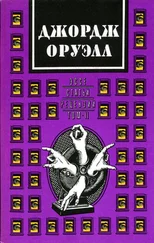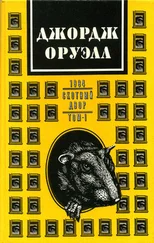On the second floor lived Lorenheim, a dark, meagre, lizard–like creature of uncertain age and race, who made about thirty–five shillings a week by touting vacuum–cleaners. Gordon always went very hurriedly past Lorenheim's door. Lorenheim was one of those people who have not a single friend in the world and who are devoured by a lust for company. His loneliness was so deadly that if you so much as slowed your pace outside his door he was liable to pounce out upon you and half drag, half wheedle you in to listen to interminable paranoiac tales of girls he had seduced and employers he had scored off. And his room was more cold and squalid than even a lodging–house bedroom has any right to be. There were always half–eaten bits of bread and margarine lying about everywhere. The only other lodger in the house was an engineer of some kind, employed on nightwork. Gordon only saw him occasionally—a massive man with a grim, discoloured face, who wore a bowler hat indoors and out.
In the familiar darkness of his room, Gordon felt for the gas–jet and lighted it. The room was medium–sized, not big enough to be curtained into two, but too big to be sufficiently warmed by one defective oil lamp. It had the sort of furniture you expect in a top floor back. White–quilted single–bed; brown lino floor– covering; wash–hand–stand with jug and basin of that cheap white ware which you can never see without thinking of chamberpots. On the window–sill there was a sickly aspidistra in a green–glazed pot.
Up against this, under the window, there was a kitchen table with an inkstained green cloth. This was Gordon's 'writing' table. It was only after a bitter struggle that he had induced Mrs Wisbeach to give him a kitchen table instead of the bamboo 'occasional' table—a mere stand for the aspidistra—which she considered proper for a top floor back. And even now there was endless nagging because Gordon would never allow his table to be 'tidied up'. The table was in a permanent mess. It was almost covered with a muddle of papers, perhaps two hundred sheets of sermon paper, grimy and dog–eared, and all written on and crossed out and written on again— a sort of sordid labyrinth of papers to which only Gordon possessed the key. There was a film of dust over everything, and there were several foul little trays containing tobacco ash and the twisted stubs of cigarettes. Except for a few books on the mantelpiece, this table, with its mess of papers, was the sole mark Gordon's personality had left on the room.
It was beastly cold. Gordon thought he would light the oil lamp. He lifted it—it felt very light; the spare oil can also was empty— no oil till Friday. He applied a match; a dull yellow flame crept unwillingly round the wick. It might burn for a couple of hours, with any luck. As Gordon threw away the match his eye fell upon the aspidistra in its grass–green pot. It was a peculiarly mangy specimen. It had only seven leaves and never seemed to put forth any new ones. Gordon had a sort of secret feud with the aspidistra. Many a time he had furtively attempted to kill it— starving it of water, grinding hot cigarette–ends against its stem, even mixing salt with its earth. But the beastly things are practically immortal. In almost any circumstances they can preserve a wilting, diseased existence. Gordon stood up and deliberately wiped his kerosiny fingers on the aspidistra leaves.
At this moment Mrs Wisbeach's voice rang shrewishly up the stairs:
'Mister Com–stock!'
Gordon went to the door. 'Yes?' he called down.
'Your supper's been waiting for you this ten minutes. Why can't you come down and have it, 'stead of keeping me waiting for the washing up?'
Gordon went down. The dining–room was on the first floor, at the back, opposite Flaxman's room. It was a cold, close–smelling room, twilit even at midday. There were more aspidistras in it than Gordon had ever accurately counted. They were all over the place— on the sideboard, on the floor, on 'occasional' tables; in the window there was a sort of florist's stand of them, blocking out the light. In the half–darkness, with aspidistras all about you, you had the feeling of being in some sunless aquarium amid the dreary foliage of water–flowers. Gordon's supper was set out, waiting for him, in the circle of white light that the cracked gas– jet cast upon the table cloth. He sat down with his back to the fireplace (there was an aspidistra in the grate instead of a fire) and ate his plate of cold beef and his two slices of crumbly white bread, with Canadian butter, mousetrap cheese and Pan Yan pickle, and drank a glass of cold but musty water.
When he went back to his room the oil lamp had got going, more or less. It was hot enough to boil a kettle by, he thought. And now for the great event of the evening—his illicit cup of tea. He made himself a cup of tea almost every night, in the deadliest secrecy. Mrs Wisbeach refused to give her lodgers tea with their supper, because she 'couldn't be bothered with hotting up extra water', but at the same time making tea in your bedroom was strictly forbidden. Gordon looked with disgust at the muddled papers on the table. He told himself defiantly that he wasn't going to do any work tonight. He would have a cup of tea and smoke up his remaining cigarettes, and read King Lear or Sherlock Holmes. His books were on the mantelpiece beside the alarm clock— Shakespeare in the Everyman edition, Sherlock Holmes, Villon's poems, Roderick Random, Les Fleurs du Mal, a pile of French novels. But he read nothing nowadays, except Shakespeare and Sherlock Holmes. Meanwhile, that cup of tea.
Gordon went to the door, pushed it ajar, and listened. No sound of Mrs Wisbeach. You had to be very careful; she was quite capable of sneaking upstairs and catching you in the act. This tea–making was the major household offence, next to bringing a woman in. Quietly he bolted the door, dragged his cheap suitcase from under the bed, and unlocked it. From it he extracted a sixpenny Woolworth's kettle, a packet of Lyons' tea, a tin of condensed milk, a tea–pot, and a cup. They were all packed in newspaper to prevent them from chinking.
He had his regular procedure for making tea. First he half filled the kettle with water from the jug and set it on the oil stove. Then he knelt down and spread out a piece of newspaper. Yesterday's tea–leaves were still in the pot, of course. He shook them out on to the newspaper, cleaned out the pot with his thumb and folded the leaves into a bundle. Presently he would smuggle them downstairs. That was always the most risky part—getting rid of the used tea–leaves. It was like the difficulty murderers have in disposing of the body. As for the cup, he always washed it in his hand basin in the morning. A squalid business. It sickened him, sometimes. It was queer how furtively you had to live in Mrs Wisbeach's house. You had the feeling that she was always watching you; and indeed, she was given to tiptoeing up and downstairs at all hours, in hope of catching the lodgers up to mischief. It was one of those houses where you cannot even go to the W.C. in peace because of the feeling that somebody is listening to you.
Gordon unbolted the door again and listened intently. No one stirring. Ah! A clatter of crockery far below. Mrs Wisbeach was washing up the supper things. Probably safe to go down, then.
He tiptoed down, clutching the damp bundle of tea–leaves against his breast. The W.C. was on the second floor. At the angle of the stairs he halted, listened a moment longer. Ah! Another clatter of crockery.
All clear! Gordon Comstock, poet ('of exceptional promise', The Times Lit. Supp. had said), hurriedly slipped into the W.C., flung his tea–leaves down the waste–pipe, and pulled the plug. Then he hurried back to his room, rebolted the door, and, with precautions against noise, brewed himself a fresh pot of tea.
Читать дальше








